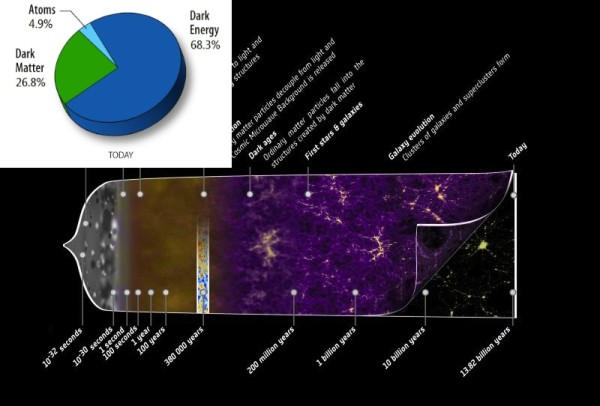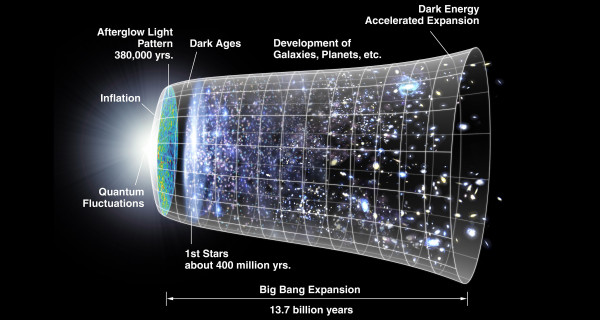“Whenever you have infinities in a theory, that’s where the theory fails as a description of nature. And if space was born in the Big Bang, yet is infinite now, we are forced to believe that it’s instantaneously, infinitely big. It seems absurd.” -Janna Levin
Of course, we don't believe space was born in the Big Bang, but this wasn't intuitive for a long time! Indeed, given the cosmic unknowns of inflation, dark matter and dark energy, and the fact that what we consider to be "normal matter" only makes up around 5% of the total amount of energy in the cosmos, isn't it time to revisit the Big Bang?
This week's Ask Ethan forces us to ask some very tough questions: in particular, if these new discoveries don't cast doubt on the Big Bang itself! In particular (excerpted):
How is it possible to extrapolate back to the big bang, when so little of the matter and force in the universe is understood?
Come and get the answers here.



New physics , new think , new cosmology .
www.scribd.com/doc/157259980
There is a classical theory that covers everything - these pdfs cover Atomic Physics, Molecular Physics, and Cosmological Physics respectively. The last is the most relevant to this post:
http://www.blacklightpower.com/wp-content/uploads/theory/TheoryPresenta…
http://www.blacklightpower.com/wp-content/uploads/theory/TheoryPresenta…
http://www.blacklightpower.com/wp-content/uploads/theory/TheoryPresenta…
The NASA image puts the first stars forming about 400 million years after the Big Bang, but the heavily modified Brock et al. image puts the first formations at 200 million years.
They are purporting this idea of Big Bang as fact! And they also say that they cannot see and do not know what most of the universe is made. And yet, they think they can explain all the way back to the very origin of it all. I can remember being taught that since hot things expand and colder things contract, and the earth was getting cooler and therefore getting smaller that the earth was getting smaller and the crust was buckling and that is how mountains occurred. And also there was a medium for the conveyance of waves and water so therefore there was a medium for conveyance of light. They called that conveyance of light was ether. Now they are beginning to say the red shift in stellar light is Doppler shift and therefore assuming an expanding universe.
Also, they say, that you can look at the farthest galaxies and see back in time because the light is taken so long to get here and see the universe as it was 13 or 14 billion years ago. But if the universe was not spread out as it is now, then how come we don't see this compacted universe (and in every direction we look). I mean what they're saying is you look outside our world in every direction and see our universe when it was very small. It just does not make any sense to me!
Ethan, your continue with this weird eccentric syntax in which you say that the Big Bang occurred after cosmic inflation. That is contrary to the statements of the vast majority of cosmologists, who say the Big Bang is the very beginning, and inflation something that is part of the Big Bang (or after the Big Bang). For example, here is a definition of the Big Bang:
"The rapid expansion of matter from a state of extremely high density and temperature that according to current cosmological theories marked the origin of the universe."
As far as I can see from studying this matter for decades, your "Big Bang after inflation" syntax is one that only you are following. What's with that? The "Big Bang" is the very beginning, not something after the very beginning. Do you have some agenda of trying to explain the Big Bang by trying to redefine it as something after Time Zero?
Big Bang = Time Zero, thus spake almost all cosmologists.
@ Mark Mahin
"from a state of extremely high density and temperature"
that state is inflation field. Thus matter came after inflation. And if Big Bang is rapid expansion of matter (incorrect btw) then it came after inflation...
Assuming the Big Bang actually took place, and I think it did, it would have been only the most recent such event. In other words it would have been the most recent in an unending series of such events. In addition, what we think of as the Big Bang likely only involved our galaxy the Milky Way. When we talk of explosions.we need to understand that there must be something to explode. Empty vacuums do not explode. Therefore, what would have exploded was a vast area of explosive debris resulting from the collapse of a galaxy that once stood in its place. The major difficulty here is human comprehension of the concept of infinity.
@ Larry
we are not talking about explosions. Period. All the incorrect mental pictures associated with explosion are what causes the misunderstanding in BB. Plus all the science shows that compete to render the bigger and better BOOM when talking about BB, are not helping.
Our Universe is a larger version ofa black hole polar jet.
It's not the big bang; it's the big ongoing.
"When we talk of explosions.we need to understand that there must be something to explode. ""
No, we must realise that we're using the word "explode" for something that doesn't have to have been an explosion.
There no more needs to have been something to explode than we need to understand the role of the Heffalump Excrement cleaner's job.
PS your claims require that you know what space and time are in detail. If you do, please write a paper for everyone to read. Otherwise realise that your claims are based off assumptions you've brought up and have not shown to be true.
The big bang theory assumes that the observed apparent redshift is entirely due to Doppler effect. The current paradigm stipulates that space isn't as empty as previously expected. There is a lot of dark matter out there. How does it affect photons? What proportion of redshift is due to re-radiation of absorbed photons at longer wavelengths? The answer will profoundly affect our calculations on the age of the universe and may possibly upset the big bang apple cart.
@Andy #11: I'd strongly recommend doing some research (use scholar.google.com to get actual journal articles, rather than random Internet woo) on these subjects. They've all been investigated in detail, and you would serve yourself better by reviewing the actual science, rather than taking someone's word for it. However, I can summarize the situation for you.
1) The cosmological redshift is _not_ "due to Doppler effect." It is entirely distinct, and is due to the variation of the cosmological metric (i.e., the scale factor a(t)) while light is traversing cosmological distances. Because the changing scale factor corresponds to an apparent motion between distant points in the cosmos, the cosmological redshift may be used to compute that apparent velocity.
2) Dark matter doesn't interact with photons, which is why it has the label "dark". If it did, then we would be able to see the absorption/interaction effects, which we don't. The current best limit on the DM/gamma-gamma cross section is something like 10^-50 cm^2 (for comparison, the cross-section for gamma-gamma scattering is roughly a picobarn, or 10^-36 cm^2).
3) The idea of "grey dust" emulating a cosmological redshift has been around for 50+ years. Such a model fails because it cannot reproduce the clear and distictive structure of absorption and emission lines seen at all redshifts. Essentially, such rescattering would wash out distinct lines and leave a smooth continuous spectrum.
We _do_ see the effects of dust absorption, both in our own galaxy and in other galaxies. You may look up "interstellar column density" to find useful information about it. These effects do not mimic redshifts, but do cause a clear decrease in intensity as a function of distance, and have their own distinctive absorption windows (wavelength bands). In other galaxies, those windows are themselves redshifted in the same way that individual atomic and molecular lines are.
So, the beginning of the universe exists as the most distant and therefore most ancient thing we can possibly observe, that being the scope of the entire observational horizon, and yet this represents at that same time both the largest thing and the smallest thing imaginable... truly amazing!
Presuming that all electromagnetic emissions continue to degrade over time and distance through a potentially infinite amount of various interferences, at what observed time/distance is it expected that only IR survives to be observed regardless of anything which might actually exist beyond that horizon?
Are extremely narrow windows of observation as necessary for high end powers prone to capture increasing levels of radiometric interference originating from sources tangent to such window?
Considering that we actually observe incident waves as opposed to actual "rays" of light, does not relative positional movements of the observed sources versus observing terminus positions over billions of years become rather onerous at some point?
@13
CMB is the furthest or earliest point that can be probed with EM. Anything beyond that is not. Regardless of frequency or range.
To get beyond that wfirewall is maybe with neutrinos or gravity waves, but that is for now only theory.
@Lloyd Hargrove #13: I'm not sure "degrade" is the right word. The cosmological redshift causes the spectrum from some object to _shift_, depending on how far away (i.e., how old) it is, but the structure of that spectrum doesn't change substantially. Indeed, that's how we discovered the cosmological redshift in the first place -- Hubble and others identified patterns of spectral lines which were all shifted systematically.
We do observe absorption and scattering of light, from sources within our galaxy. Those effects do _not_ shift spectral lines systematically (and hence do not look anything like redshift). Rather, they reduce intensity and add additional absorption lines to the spectrum, due to the intervening gas and dust. These effects are well understood and quantifiable in observation.
The cosmological density is so low, and the scattering cross-sections so small, that light propagates essentially in straight lines, even from distant galaxies. Where it is deflected, for example due to gravitational lensing, the effect is local and quantifiable. Random scattering (e.g., off of dust) does not preserve pointing.